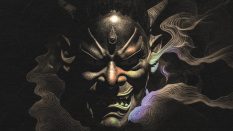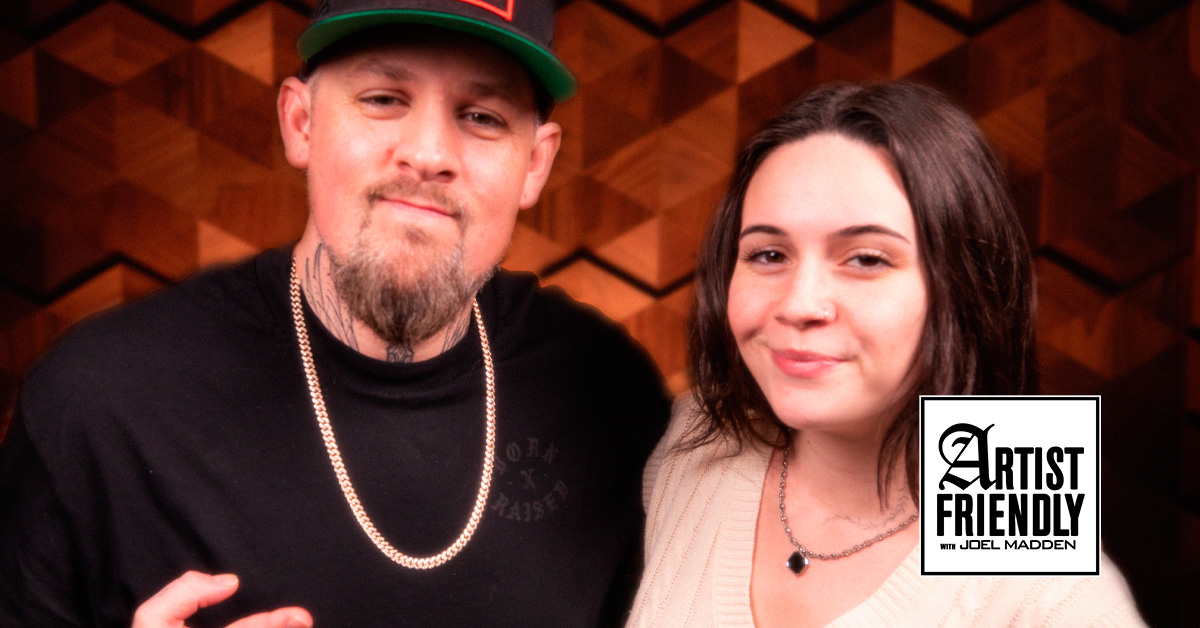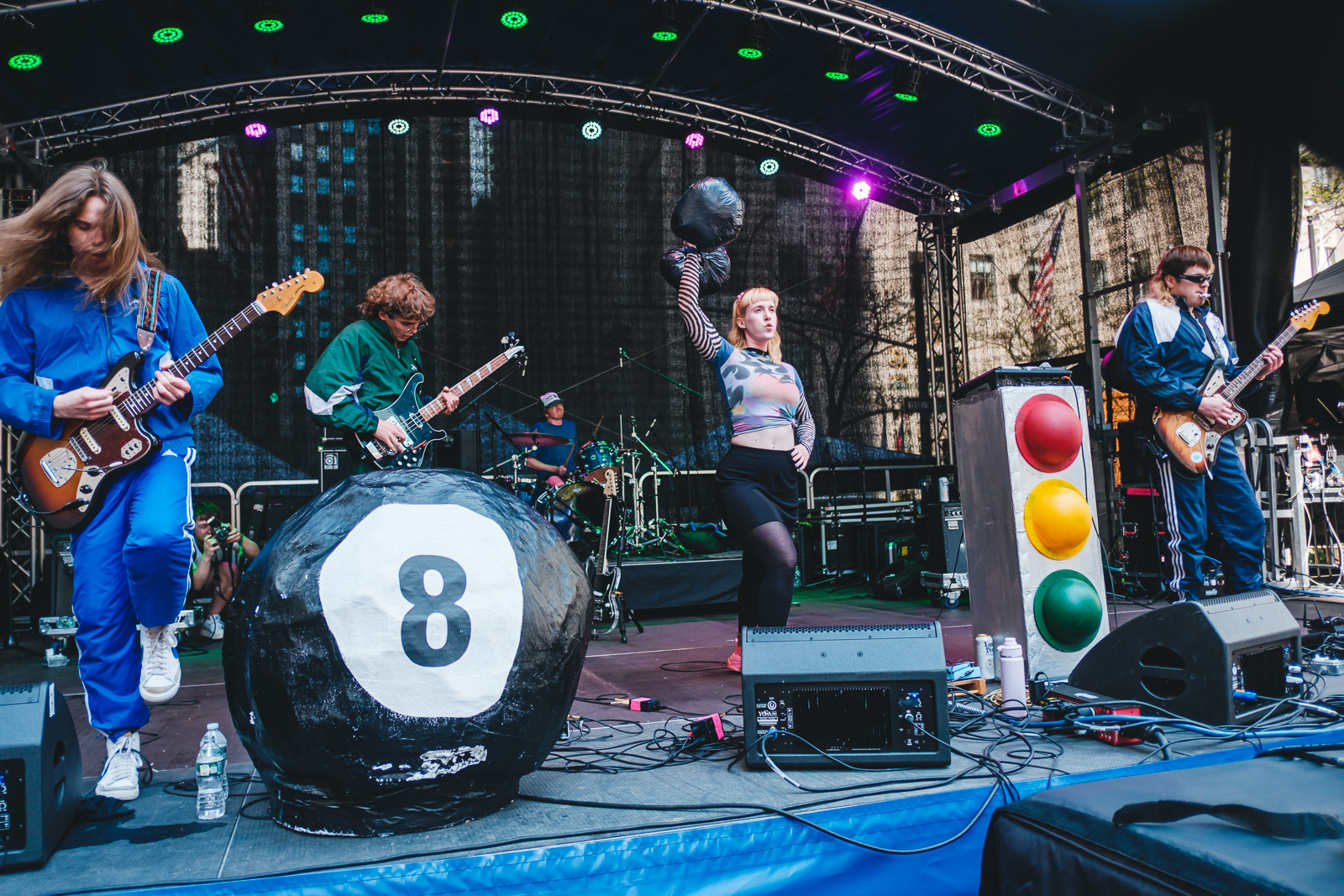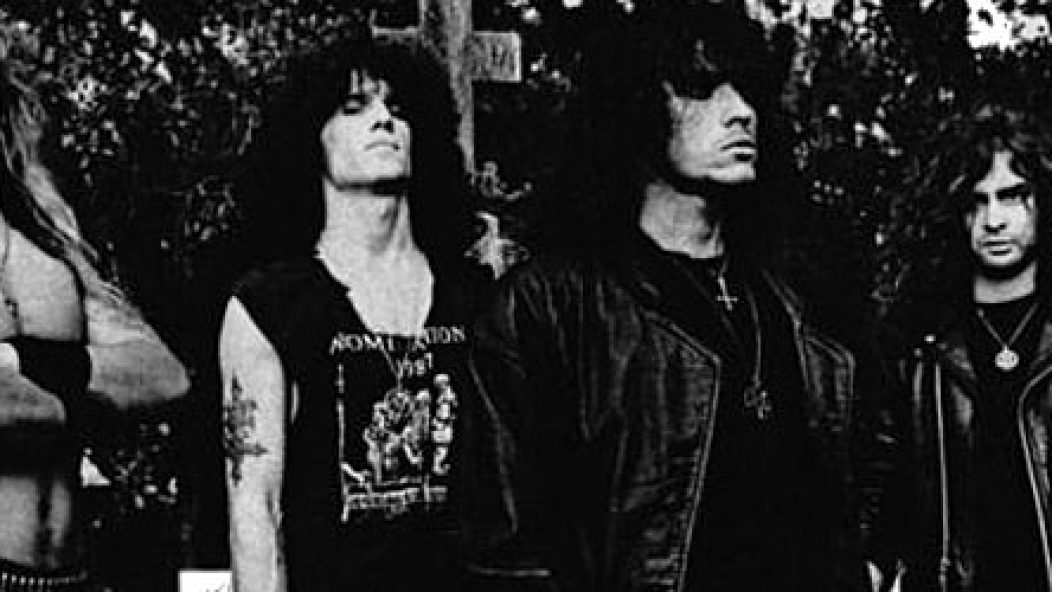
Interview: Dave Vincent of Morbid Angel
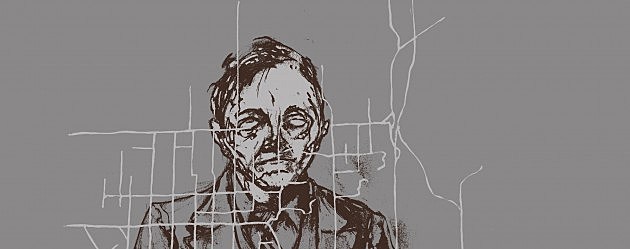
…
Morbid Angel are currently wrapping up their month-long Covenant 20th anniversary tour, on which they’re playing the album in full. The tour, like the “old-school set” Slayer tour that we covered earlier this week, drew its share of cynical responses from observers. Not without cause. Morbid Angel’s last album, Ilud Divinum Insanus, was a critical disaster of St. Anger proportions. How better to get back in your fanbase’s good graces than to tour behind your most popular release?
As with Slayer, today’s Morbid Angel bears only a rough visual resemblance to their salad-days incarnation. Pete Sandoval, always the band’s anchor, is gone. Trey Azagthoth shares guitar duties with Thor Myhren of Zyklon. Dave Vincent, their bassist and vocalist, has dyed-black hair and mutton chops; h wears the puzzling leather jerkin you see above onstage. But at least at their NYC appearance on November 12, these superficialities were irrelevant. Tim Yeung played Sandoval’s parts convincingly, and perhaps more precisely than Sandoval himself would’ve. Azagthoth remains the premiere lead-guitar virtuoso of his genre. And Vincent, as odd as he looks today next to pictures of the blonde hesher of yore, sounds just like he did on Domination, if not on Covenant itself.
Because of the time required for transcription, I rarely conduct in-person interviews these days. (Thus also the lengthy gap between the NYC show and this publish date.) When I do, they’re usually with musicians whom I have unequivocally positive feelings towards. Vincent is a more difficult case. While he played a vital role in creating some of the best death metal ever recorded — Covenant is arguably the pinnacle of the genre — I have no more affection for Morbid Angel’s newest effort than most of their other fans do.
Vincent is no doubt cognizant of the hostile atmosphere he currently faces, and his demeanor during our conversation was reserved and a bit defensive. (He was not amused when I jokingly asked him whether he could take Glen Benton in a fight at the end of the interview.) But he was nonetheless thoroughly polite throughout, and better-spoken than many would give him credit for. After twenty-five years in the biz, he is a professional many times over, and he continues to feel his way forward over the alien territory of the 21st century.
…
Altars of Madness and Blessed Are the Sick both experienced 20-year anniversaries a few years back. Why did you guys choose to revisit Covenant specifically?
That’s a good question. We kind of played Altars through by default back when we put it out. That was the material we had, so we played it in order. This tour was just an idea that I had been thinking about for a few years, and we eventually talked about it and thought it’d be something cool to do — a themed tour where everyone knows what we’ll play.
I always tell people that when you’ve done nine or ten records, there are certain songs that you kind of have to play, that people expect to hear. Those take up probably half the set. Then you have the other half of the set, where you’re trying to touch on this and touch on that. Sometimes that half works well and sometimes it doesn’t. It seems like if you do a themed tour, you can add a couple songs here or there from all over, and that’s what we’re doing here.
Some Covenant tracks are Morbid Angel live staples, but it’s got its share of deeper cuts too.
There’s actually one song that we played only for the tour when the record came out, and there’s one song — “Lion’s Den” — that we never played live. This is the first tour that that thing has ever been played outside of the studio.
So did you have to go back and relearn that material?
Well, I listened to them. We reviewed everything, and it came back. It’s not like playing a cover; a lot of this is muscle memory.
Only you and Trey remain from the Covenant lineup. You’re touring with Thor on guitar and Tim on drums. Is it weird to play this album without Pete Sandoval?
Nope. Not at all. Tim’s an excellent drummer. He handles the material very well. He was a big fan of the record when it came out, too. He’s a couple years my junior, but it’s cool. He feels the songs really well, and it’s fun.
Is Pete still an official member of the band? He’s still listed as one in various places online.
Pete’s no longer in Morbid Angel.
I know he publicly said some unkind things about the last record after it came out.
Well, his whole way of life has changed. He’s in a different spot, and the spot that he’s in right now, Pete Sandoval and Morbid Angel are not compatible.
How so?
Well, he has found Jesus. You can see where the incompatibility comes from.
…
…
Covenant came out in 1993, which was in many ways the peak of death metal as a commercial genre — Carcass’s Heartwork, Entombed’s Wolverine Blues, Death’s Individual Thought Patterns, and Dismember’s Indecent & Obscene all came out that year, among others. Morbid Angel were the first death metal band to sign to a major. What was it like to be at the center of all of that?
I looked at it as an opportunity more than anything else. It gave us some muscle to get us into the big boys’ swimming pool, as it were. We had to work a lot harder, obviously, but we had some opportunities available to us that weren’t before. We got on some really good tours. We had some really good videos. It takes a lot of money to do some of these things, and Warner has very deep pockets. They allowed us to realize some of our dreams — we got to do some things that I enjoyed a lot, and that the fans tell me they enjoyed as well.
Do you feel like you capitalized on that opportunity as much as you could’ve?
Gosh, well, I guess you could always do more. But I think that we pushed what we do pretty darn far for what it is. It’s not commercial music. We have some stuff that’s catchy in its own way, but not to the mainstream. Although, it’s interesting. Listening back now, I hear a lot of things that arguably we helped to pioneer. There are elements of that which I hear in all manner of kinds of music, including pop. Which is cool.
Covenant is really catchy for a death metal record.
That’s just what we do, y’know? But all these other bands that you mentioned — we’re all very different. Today, what I hear is a lot of things that sound the same. I don’t hear the sense of individuality that I felt with us or some of the other Florida bands — Obituary, Death, those bands. When people talk about a “Florida sound,” I don’t know what that would be. We all sound very different. The tones, the song structures, everything about us was very different.
Nowadays, I don’t think there’s so much emphasis put on identity as there is on groupthink: “What’s this style, or that style?” Style doesn’t mean a lot to me. Quality means everything to me. If there’s anything that I wish that I heard more of these days, it’s the same differentiation that I heard back when we were cutting our teeth.
…
…
Your vocal delivery on Covenant is noticeably deeper and more guttural than your stuff on Blessed and Altars. Your delivery is also pretty different on Domination. Did you make that change consciously?
I don’t know if it was deliberate or not. It was just kind of what I was feeling at the time. When we we did Altars, I was a smoker, which might’ve had something to do with it. Getting rid of that helped a lot of things for me, personally. Cigarettes are nobody’s friend.
Over the course of that period, death metal vocals got more extreme and more guttural. Did you think about that at the time?
I think my vocals sound different from most people’s. I try to emphasize clarity and articulation. If I have to read along too much, and the stuff I’m reading doesn’t even sound like what I’m hearing, that doesn’t do anything for me.
Why is the vocal delivery so different on “Angel of Disease” from the rest of the album?
I’m not sure. I just felt like that’s what I wanted to do on that song. It’s a little older. (Editor’s note: “Angel of Disease” originally appeared on Abominations of Desolation, Morbid Angel’s scrapped debut.) There are other songs on that record where the vocals are kinda mid-rangey. I like diversity. “God of Emptiness” is a lot different too. I don’t really have one setting; I like changing settings. That’s a me thing. It’s not from a different session or anything; it was done at the same time. I just took a different approach.
What do you do to maintain your voice on the road?
Well, sleep is not my enemy. Obviously you want to stay hydrated. You don’t wanna stay up late after a show and yell over loud DJ music. It helps to contain myself and be at the right energy level at the right time. I do vocal warm-ups, in the same way that you warm your body up. I have about an hour-long ritual that I go through. It gets me ready, and then I do the same thing before I go to bed — another ritual. There’s a lot of water involved. You drink as much water as possible. Sometimes that water has alcohol in it, but these things happen.
It’s remarkably uncommon that people do anything specific to maintain their voices on the road. I don’t know how some guys do it.
Well, the thing is, I have to maintain my body. I have a good diet and I take care of myself. If any of the other guys feel a little sick, or get a sore throat, they can still carry on. But when those things happen to me, my job becomes a lot more challenging. So I have to mind common-sense Ps and Qs. When it’s cold, I stay out of the cold as much as possible. If I’m in an arid environment, I want to make sure that I’m extra hydrated, and sometimes I’ll even put a small humidifier on the bus, just to keep the air a little more breathable.
I live in Florida. We have warm, humid air that is excellent for your skin, your voice, your nasal passages, and everything else. When I get out of that, it disturbs me more than it would than people who are accustomed to doing without it. People who live in California — they’re fine with it. When I go out there: chapstick, lotion, eyedrops. I have to use these things constantly.
…
…
You’ve been at this for some time now.
A couple of years, yes.
The music industry and the music scene have changed a lot during that period. Would you rather be an 18-year-old starting a death metal band today, or back in the ‘80s when Morbid Angel began?
I don’t wish for anything different from what is, right now. I think that the challenges now would be…well, it’s always been challenging. There’s more of an open playing field now. It’s not just that you have to have such and such label to do such and such things. There’s a lot of DIY stuff that’s happening now that couldn’t have happened then. But it’s much more difficult to monetize anything. It costs money to do all of these things. It’s expensive to have crew — we pay the crew’s salaries. It’s expensive to have a bus that’s capable of getting this whole Partridge Family experience down the road. It all takes money. There are some economic challenges now that we have to deal with that we didn’t have back then. There’s always going to be some kind of challenge, though. And I like challenges. But some of the way that we cut our teeth is not the same path that one would go down today.
There was no internet when we were getting started.There was tape-trading, and there were small fanzines, and there were people who got connected that way. You had to work for it. You had to work to be a fan. The fans worked as hard at being fans as some of the bands worked at being bands. That part has definitely changed these days — the relationship between artists and their admirers. It’s interesting, and it’s a lot different. I don’t know the current way as well as the way that I did it. But the way that I did it is not the way it’s done anymore.
Have these changes in the economics and logistics of the industry affected the way that Morbid Angel operates, relative to the way that you did 20 years ago when Covenant came out?
Well, not so much us, but certainly some of the people who have come after us. They’ve grown up in a different world. Where Morbid Angel is at now, we have kind of an iconic status, and that affords us some things that only time can provide. There’s the old song: “I’ve been working on the railroad.” If you work on the railroad for long enough and you’ve got a railway. But you can’t expect to hop in that train right at the beginning. You have to build a track first.
…







